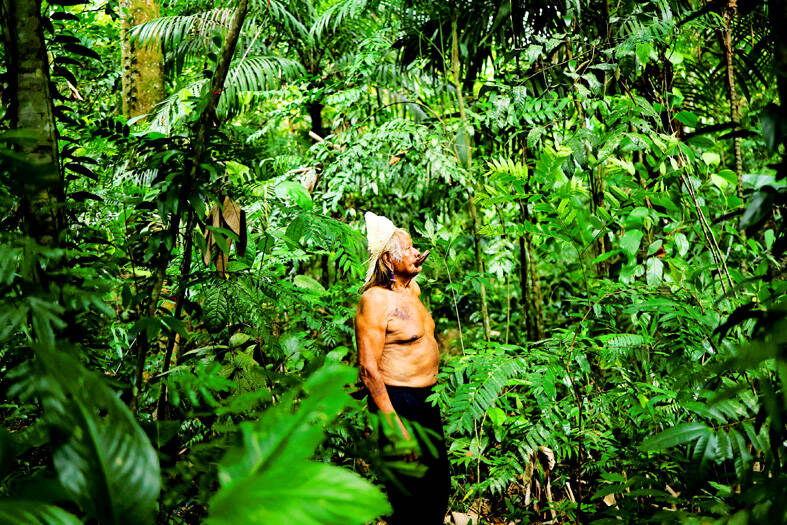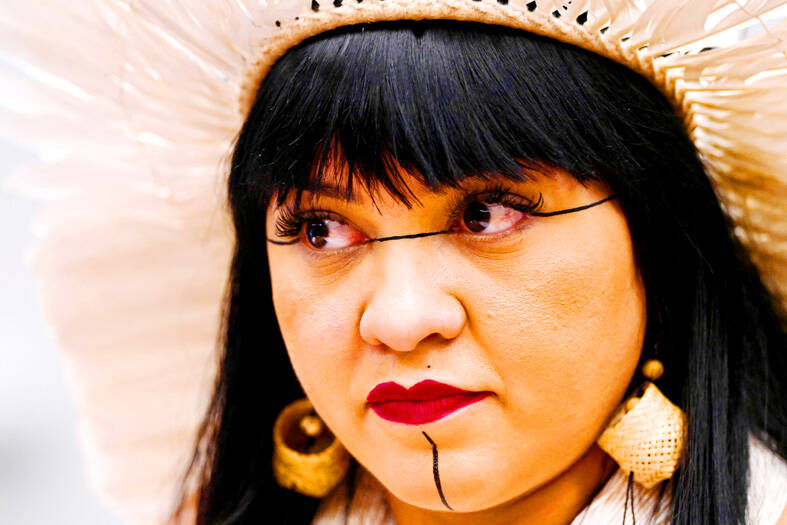Brazilian indigenous lawmaker Celia Xakriaba made history when she was elected to the Brazilian Congress, but she said she sometimes gets called “Indian,” and asked if she is in the legislature selling handcrafts, showing how deep prejudice still runs.
It has been an empowering year for native peoples in Brazil, where a record five indigenous lawmakers gained seats in the lower chamber and Brazilian President Luiz Inacio Lula da Silva created a new indigenous peoples’ ministry.
Indigenous rights activists said the gains are long overdue for groups that have endured a tortured history of abuses since colonial times, and whose defense of their ancestral lands — including in the crucial Amazon rainforest — plays a vital role in fighting deforestation and climate change.

Photo: Reuters
However, Xakriaba, 34, said that indigenous Brazilians still face “constant racism,” including in the conservative-majority legislature, dominated by allies of far-right former Brazilian president Jair Bolsonaro.
“We’re used to facing bullets and genocide on our land... But even here [in Congress] people often try to silence us,” Xakriaba said, wearing traditional face paint and a blue-and-white feather headdress.
She has been subjected to degrading remarks, while some colleagues in the 513-member Brazilian Chamber of Deputies have targeted her with “intimidating” comments, Xakriaba said.

Photo: AFP
It has not stopped the young lawmaker, who hails from the southeastern state of Minas Gerais, from doing what she came to Brasilia to do: Defend diversity, indigenous lands and the environment — even if that means clashing with the powerful agribusiness lobby.
“We’re here to ‘reforest’ Congress,” she said.
Indigenous leaders in Brazil have won international recognition for their fight for the environment, including icons such as chief Raoni Metuktire, who rose to fame in the 1980s campaign against deforestation with the English singer Sting.
However, until recently, indigenous Brazilians were largely excluded from political power.
That is changing, with five indigenous candidates elected to the lower house in the country’s elections in October last year — but none won office in the 81-member Brazilian Senate.
Lula, who took office in January, named respected indigenous leader Sonia Guajajara to head a newly created ministry defending the interests of Brazil’s 1.7 million indigenous people — about 0.8 percent of the country’s population of 203 million.
Indigenous movements are now preparing for Brazil’s local elections next year, striking alliances with progressive parties and pressuring the courts to require electoral funding and media access for native candidates.
That is just the beginning, said Dinamam Tuxa, coordinator of the Brazilian Indigenous Peoples’ Association.

FORUM: The Solomon Islands’ move to bar Taiwan, the US and others from the Pacific Islands Forum has sparked criticism that Beijing’s influence was behind the decision Tuvaluan Prime Minister Feletei Teo said his country might pull out of the region’s top political meeting next month, after host nation Solomon Islands moved to block all external partners — including China, the US and Taiwan — from attending. The Pacific Islands Forum (PIF) leaders’ meeting is to be held in Honiara in September. On Thursday last week, Solomon Islands Prime Minister Jeremiah Manele told parliament that no dialogue partners would be invited to the annual gathering. Countries outside the Pacific, known as “dialogue partners,” have attended the forum since 1989, to work with Pacific leaders and contribute to discussions around

END OF AN ERA: The vote brings the curtain down on 20 years of socialist rule, which began in 2005 when Evo Morales, an indigenous coca farmer, was elected president A center-right senator and a right-wing former president are to advance to a run-off for Bolivia’s presidency after the first round of elections on Sunday, marking the end of two decades of leftist rule, preliminary official results showed. Bolivian Senator Rodrigo Paz was the surprise front-runner, with 32.15 percent of the vote cast in an election dominated by a deep economic crisis, results published by the electoral commission showed. He was followed by former Bolivian president Jorge “Tuto” Quiroga in second with 26.87 percent, according to results based on 92 percent of votes cast. Millionaire businessman Samuel Doria Medina, who had been tipped

Outside Havana, a combine belonging to a private Vietnamese company is harvesting rice, directly farming Cuban land — in a first — to help address acute food shortages in the country. The Cuban government has granted Agri VAM, a subsidiary of Vietnam’s Fujinuco Group, 1,000 hectares of arable land in Los Palacios, 118km west of the capital. Vietnam has advised Cuba on rice cultivation in the past, but this is the first time a private firm has done the farming itself. The government approved the move after a 52 percent plunge in overall agricultural production between 2018 and 2023, according to data

ELECTION DISTRACTION? When attention shifted away from the fight against the militants to politics, losses and setbacks in the battlefield increased, an analyst said Recent clashes in Somalia’s semi-autonomous Jubaland region are alarming experts, exposing cracks in the country’s federal system and creating an opening for militant group al-Shabaab to gain ground. Following years of conflict, Somalia is a loose federation of five semi-autonomous member states — Puntland, Jubaland, Galmudug, Hirshabelle and South West — that maintain often fractious relations with the central government in the capital, Mogadishu. However, ahead of elections next year, Somalia has sought to assert control over its member states, which security analysts said has created gaps for al-Shabaab infiltration. Last week, two Somalian soldiers were killed in clashes between pro-government forces and